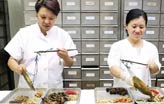Op-Ed Contributors
The dilemma of holding US govt debt
Updated: 2011-08-30 08:10
By Michael N.T. Tan (China Daily)
The first and most important attribute is that it must be fully convertible. The yuan now is only convertible in current or trading account, not investment or capital account. The reason for this is partly historical, because China suffered from dearth of capital in the early years of economic reform and capital controls had to be put in place, even though that is no longer the case.
Second, the yuan must be allowed to freely float in the market. The central bank still maintains the yuan's value within fixed bands, although the yuan has revaluated almost 30 percent since it was de-pegged from the dollar six years ago.
Third, China's debt, securities and capital markets are not sufficiently deep and sophisticated enough to cope with the role of the yuan as a reserve currency.
If the yuan is not ready to be a reserve currency now, will it be sometime in the future? The question, whether the yuan should or should not become a reserve currency, has already sparked a debate both within and outside the country.
One distinct advantage of having a reserve currency is that it allows the host nation to print as much currency notes as other nations are prepared to hold as their foreign exchange reserves. In other words, the host country can technically print huge amounts of its currency and use them to acquire foreign assets and can do so without worrying about pushing up inflation in its domestic market.
The disadvantage of having a reserve currency is that the host country must be prepared to run large trading and/or budget deficits so that other countries can accumulate sufficient amounts for use as reserve exchange. Since China now has trading surpluses with many countries, it will have to completely change its currency alignments to run trade deficits. This will deal a blow to small- and medium-sized enterprises, which cannot cope with skyrocketing values of the yuan.
Whether the yuan becomes an international currency or a reserve currency depends not only on the actions of the Chinese government, but more importantly on outside forces of trade, finance and investment that determine its pace and direction.
The yuan has been revaluating, and this process must continue. At some point, it will find its equilibrium vis-a-vis other currencies, and only then the People's Bank of China can stop fretting about its fluctuations.
The author is a research scholar in China studies at the University of New South Wales, Sydney.
(China Daily 08/30/2011 page9)

Specials

Flying the TCM flag
A small German town is home to Europe's flagship clinic for traditional Chinese medicine

Hunting grounds
Opinion divided as China debates opening door to international players

Animal attraction
World's youngest chief fur designer set to launch own label and tap into huge China market.